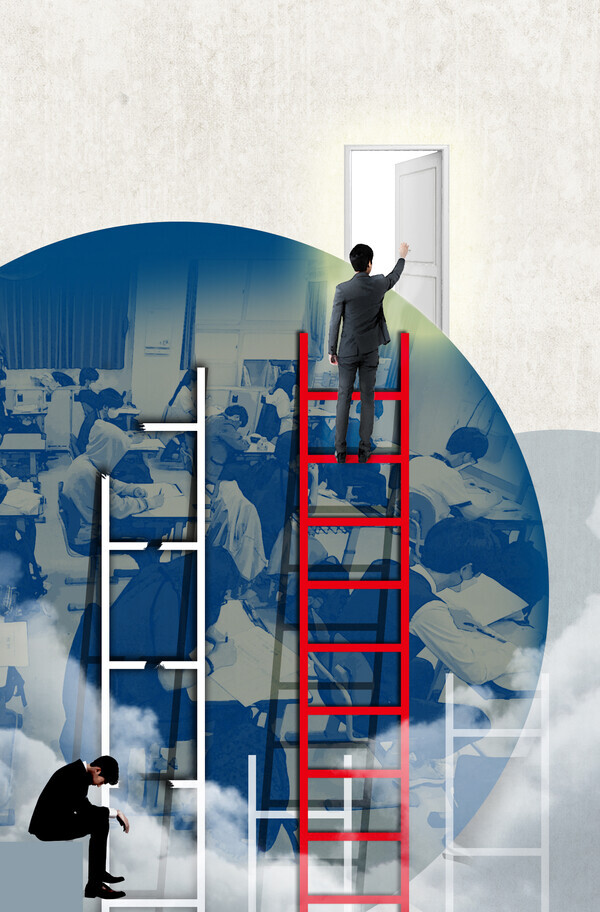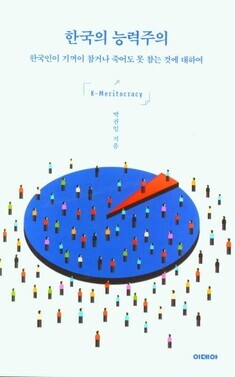hankyoreh
Links to other country sites 다른 나라 사이트 링크
[Book review] “Korean Meritocracy” examines why S. Koreans tolerate inequality, but not unfairness


By Park Kwon-il, Idea Books
“Inequality” is a key term that has continued to surface every time there has been a debate over the problems plaguing South Korean society over the past few years.
Many people voice concerns and anger over inequality, which they see as a big problem. But survey findings tell a quite different story.
The World Values Survey is a project with a 40-year history starting in 1981. Social scientists from around the world take part in it, with findings released every four to five years. One of the questions it asks is whether the respondent thinks income should be equal, or whether they think it should differ according to effort and other factors.
The findings from the sixth survey (2010–2014) showed 23.5% of South Korean respondents favoring equality, compared with 58.7% favoring inequality. Their preference for inequality starkly contrasted the respective percentages for Germany (57.7% and 14.6%), the US (29.6% and 36.2%), and China (52.7% and 25.8%).
The findings from the most recent, seventh wave of the survey (2017–2020) had an even higher percentage of South Koreans favoring inequality at 64.8%. Only 12.4% favored equality.
Presenting these survey findings, the author of “Korean Meritocracy” describes his book as a “report on a South Korean society and South Korean public that will tolerate inequality, but not unfairness.”
According to author Park Kwon-il, the “vast majority of complaints regarding fairness in South Korea are not about results being unequal, but about processes being opaque.”
In other words, people take issue with whether the opportunity to pursue rewards is fair, and whether those rewards are distributed properly according to ability. Conversely, that means that they are willing to accept inequality of outcomes as long as the process itself is seen as fair.
Park argues that the principal factor behind this mentality is the firmly meritocratic beliefs of South Korea as a society. From a meritocratic perspective, it stands to reason that greater rewards will go to those who possess greater abilities or work harder, while a lesser share will go to those who lack ability and effort. Since there are clear differences in individuals’ abilities, the inequalities that arise as a result are seen as justifiable.
This meritocratic mindset is the “ideology that has long governed Koreans,” in a “society on the cutting edge of capitalism and meritocratic systems,” the author explains. In his analysis, a number of Korean phenomena are closely tied to meritocratic beliefs: the excessive zeal for education, the fixation on resume building and connections, and the drive for social advancement, with its characteristic attitude of “If you don’t like the way things are, make something of yourself.”
Korean meritocracy has become entrenched and intensified through a process leading from the gwageo (national civil service examination) system in the past to social Darwinism, careerism, the new state examination system, and recent academic elitism.
Academic elitism, in particular, may be the single most defining trait of “K-meritocracy.” On the surface, many people may insist that academic history and connections are not a reflection of “actual ability.” In practice, however, a person’s educational background is clearly recognized as an indicator of ability.
Academic background is seen as a product of a person’s capabilities, while serving as the surest means of guaranteeing upward mobility. Academic elitism also ties in with another defining aspect of K-meritocracy: its fixation on examinations.
Despite endless talk about the ills of Korea’s examination-based system, tests are still used as the chief means of assessing capabilities — ostensibly because we don’t have any viable alternatives to turn to.
The problem arises when we rationalize test-based rent-seeking practices.
The term “rent-seeking” refers to actions that attempt to achieve gains by taking advantage of ownership without any improvements in productivity. With some examinations, the mere fact that one has passed confers rewards that unsuccessful candidates cannot hope to match. In a winner-takes-all pyramid, test-taking becomes a process of deciding who is entitled to privileges.
After examining the characteristics of K-meritocracy, Park goes on to critique the limits of the concept of meritocracy itself. In the real world, meritocracy assumes aspects of a caste system in disguise.
Opportunities for university admission, corporate jobs, government exams, and law school are ostensibly open to everyone. But people’s points of departure vary greatly, depending upon the support they receive from their parents and their socio-economic circumstances. There isn’t the kind of equality of opportunity that would meaningfully compensate for the actual conditions of life so that people could develop their abilities and exert effort.
This brings us back to questions about the ideal of meritocracy. If factors such as inherited wealth could be eliminated, would distributing resources based on individual ability be such a terrible thing?
To critique that position, the author draws upon the theories of social philosophers such as John Rawls. According to Rawls, natural talents belong to the individual, but because the differences between individuals’ talents are purely coincidental, individuals cannot be said to deserve those talents.
Rawls makes a similar argument about effort. Individuals cannot take credit for their own personality, which is dependent upon conditions in their home and their society, he says.
Another problem with effort is that it cannot be measured objectively.
If we further accept the hypothesis that the main source of wealth is common assets — a stance gaining wider currency in contemporary economics — the individual contribution becomes extremely insignificant, leaving meritocracy with little ground to stand on.
The key problem with meritocracy is that it perpetuates inequality, discrimination, hatred and exclusion. In a society dominated by meritocracy, “the structural contradictions of inequality are shouldered entirely by the individual” and “the critical attention that should be directed at inequality is wholly diverted to the controversy over unfairness.”
“A society that mobilizes disparity and inequality to compel lives of brutal competition is neither just, happy, nor efficient. We need must focus our attention not on unfairness but on inequality itself and encourage renewed civic interest in the topic,” Park writes.
By Ahn Seon-hee, staff reporter
Please direct questions or comments to [english@hani.co.kr]

Editorial・opinion
![[Column] Park Geun-hye déjà vu in Yoon Suk-yeol [Column] Park Geun-hye déjà vu in Yoon Suk-yeol](https://flexible.img.hani.co.kr/flexible/normal/500/300/imgdb/original/2024/0424/651713945113788.jpg) [Column] Park Geun-hye déjà vu in Yoon Suk-yeol
[Column] Park Geun-hye déjà vu in Yoon Suk-yeol![[Editorial] New weight of N. Korea’s nuclear threats makes dialogue all the more urgent [Editorial] New weight of N. Korea’s nuclear threats makes dialogue all the more urgent](https://flexible.img.hani.co.kr/flexible/normal/500/300/imgdb/original/2024/0424/7317139454662664.jpg) [Editorial] New weight of N. Korea’s nuclear threats makes dialogue all the more urgent
[Editorial] New weight of N. Korea’s nuclear threats makes dialogue all the more urgent- [Guest essay] The real reason Korea’s new right wants to dub Rhee a founding father
- [Column] ‘Choson’: Is it time we start referring to N. Korea in its own terms?
- [Editorial] Japan’s rewriting of history with Korea has gone too far
- [Column] The president’s questionable capacity for dialogue
- [Column] Are chaebol firms just pizza pies for families to divvy up as they please?
- [Column] Has Korea, too, crossed the Rubicon on China?
- [Correspondent’s column] In Japan’s alliance with US, echoes of its past alliances with UK
- [Editorial] Does Yoon think the Korean public is wrong?
Most viewed articles
- 1‘We must say no’: Seoul defense chief on Korean, USFK involvement in hypothetical Taiwan crisis
- 2N. Korean delegation’s trip to Iran shows how Pyongyang is leveraging ties with Moscow
- 3[Column] Park Geun-hye déjà vu in Yoon Suk-yeol
- 4Amnesty notes ‘erosion’ of freedom of expression in Korea in annual human rights report
- 5‘Weddingflation’ breaks the bank for Korean couples-to-be
- 646% of cases of violence against women in Korea perpetrated by intimate partner, study finds
- 7[Reportage] On US campuses, student risk arrest as they call for divestment from Israel
- 8“Parental care contracts” increasingly common in South Korea
- 9[Interview] Dear Korean men, It’s OK to admit you’re not always strong
- 10Korean government’s compromise plan for medical reform swiftly rejected by doctors